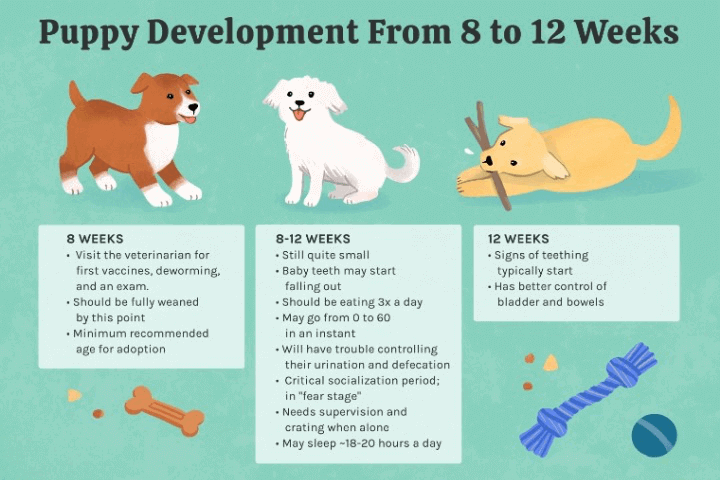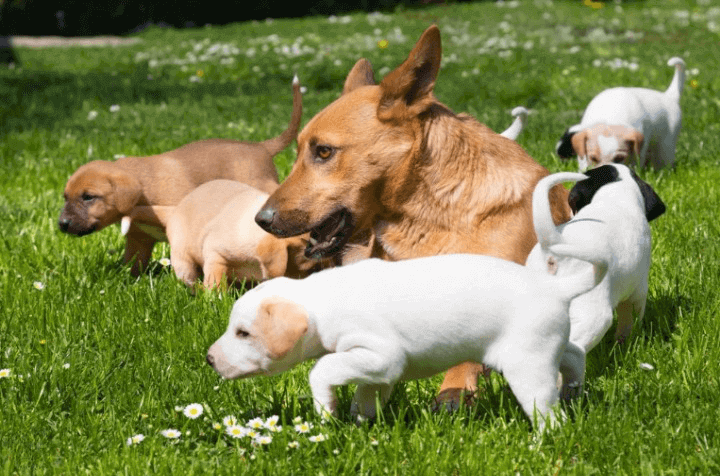The bond between a mother and her puppies is undeniably strong, as she provides them with the necessary care and guidance for their early development. However, there comes a time when these young canines must be separated from their maternal figure and introduced to their new homes.
This pivotal moment in a puppy’s life raises important questions about the ideal age for separation, considering various factors that contribute to their overall well-being. In order to ensure a smooth transition into their new environment, it is crucial to understand the developmental milestones of when can puppies leave their mom and the significance of proper socialization and bonding during this critical period.
This article aims to explore when puppies can leave their mother by examining these aspects while providing practical tips for those embarking on this journey of nurturing our four-legged companions.
Key Takeaways
- The ideal age for puppies to be separated from their mother depends on various factors and can significantly influence their long-term well-being.
- Premature separation can cause stress, anxiety, and behavioral issues in puppies, so health and behavioral risks should be evaluated before separating them from their mother.
- Early weaning is crucial for puppies’ growth and development, but premature weaning can leave them vulnerable to infections.
- Proper socialization and bonding are crucial for healthy relationships, so separation from littermates at an early age may hinder social development. Gradual exposure to stimuli and socialization strategies can help puppies interact appropriately and ensure well-adjusted puppies.
Developmental Milestones of Puppies
The developmental milestones of puppy serve as a testament to their remarkable growth and transformation during their early stages of life. Understanding these milestones is crucial for anyone involved in puppy behavior and training.
Puppies go through several key stages of development, including the neonatal period, transitional period, socialization period, juvenile period, and adolescence. Each stage is characterized by distinct physical and behavioral changes.

During the neonatal period, puppies are completely dependent on their mother for nourishment and warmth.
As they enter the transitional period, their senses start to develop rapidly, allowing them to explore their surroundings more actively.
The socialization period is a critical phase where puppies learn to interact with humans and other animals, shaping their future behavior.
The juvenile period marks further growth physically and mentally until they reach adolescence when hormonal changes occur.
Understanding these milestones is essential for providing appropriate care and guidance during puppy training endeavors.
Ideal Age When Can Puppies Leave Their Mom

Optimal timing for separation from the mother during the early development of canines significantly influences their long-term well-being. Early weaning, which refers to the process of transitioning puppies from their mother’s milk to solid food, is a crucial milestone in their growth and development. Puppies rely on their mother’s milk for essential nutrients and antibodies that boost their immune system.
However, as they grow older, they begin to explore solid food and gradually become less dependent on nursing. In terms of maternal instincts, mothers usually start encouraging independence by discouraging nursing and showing signs of frustration when puppies attempt to suckle.
It is recommended that puppies stay with their mother until they are at least eight weeks old, as this allows them to learn important socialization skills from both their mother and littermates. This period also helps establish a strong foundation for future emotional well-being and behavior.
Factors to Consider Before Separating Puppies
Before considering separation, it is important to evaluate various factors that can impact the well-being and development of young canines. One crucial factor to consider is the emotional impact on both the puppies and their mother. Separating puppies too early can lead to increased stress and anxiety for both parties involved. Puppies rely on their mother for comfort, socialization, and learning important behaviors. Premature separation may result in behavioral issues such as separation anxiety or aggression later in life.

Additionally, health and behavioral risks must be taken into account before separating puppies from their mother. The mother’s milk provides essential nutrients and antibodies that strengthen the immune system of the puppies. Premature weaning can leave them vulnerable to infections and diseases. Furthermore, being separated from their littermates at an early age may hinder proper social development, leading to difficulties in forming relationships with other dogs in the future.
Considering these factors is crucial in ensuring the overall well-being and success of young canines before they are separated from their mother.
Importance of Proper Socialization and Bonding
Proper socialization and bonding are crucial for young canines to develop healthy relationships with other dogs in the future. Bonding techniques play a significant role in creating a strong emotional connection between puppies and their human caregivers. This can be achieved through activities such as gentle handling, positive reinforcement training, and spending quality time together.

Additionally, socialization strategies help puppies become familiar with various environments, people, and animals, reducing the likelihood of fear or aggression later on. Gradual exposure to different stimuli, such as noises, objects, and other dogs, allows puppies to learn how to interact appropriately and adapt to new situations.
Puppy classes or supervised playdates provide opportunities for controlled interactions with other well-socialized dogs, promoting positive social behaviors. By implementing effective bonding techniques and socialization strategies during the early stages of a puppy’s life, dog owners can ensure their furry companions grow up to be well-adjusted and socially adept individuals within their canine community.
Tips for a Smooth Transition from Mother to New Home

A seamless transition from the mother’s care to a new home is essential, akin to a delicate thread connecting two worlds. To ensure a smooth adjustment for both the puppy and its new owners, several key steps should be followed during the puppy adoption process.
- Preparation: Before bringing the puppy home, it is crucial to create a safe and welcoming environment. This includes setting up a designated area with necessary supplies such as food, water bowls, bedding, and toys.
- Gradual Introduction: Allow the puppy to explore its new surroundings gradually. Introduce family members one at a time and provide positive interactions to establish trust.
- Establishing Routine: Consistency is vital in helping the puppy adapt quickly. Establishing a routine for feeding, potty breaks, exercise, and training will provide structure and promote bonding between the pup and its new family.
By following these guidelines, individuals can ensure that their new adopted dogs have an easier transition into their forever homes while establishing a strong foundation for future growth and companionship.
See Also:
- How Long Can Dogs Hold Their Pee
- Why Do Dogs Fart? Exploring the Canine Flatulence Phenomenon
- What Do Dog Ear Mites Look Like
- Do Mosquitoes Bite Dogs
- Can Humans Get Worms From Dogs
- Shivering in Dogs
- Why Does My Dog Nibble On Me
- How To Clean Dogs Ears
Conclusion
In conclusion, the timing for when puppies can leave their mother is a critical consideration to ensure their health, development, and emotional well-being. While the general guideline of around 8 weeks of age is commonly followed, it’s important to prioritize individual puppy readiness, socialization, and proper weaning. Early separation can lead to potential behavioral and health issues, so responsible and informed decisions should be made with the best interests of the puppies in mind.
By allowing puppies to stay with their mother and littermates for an appropriate duration, we can contribute to fostering happy, confident, and well-adjusted dogs that will thrive in their new homes.
If you can’t find the right dog for you to adopt locally, please consider adopting a dog from Bone Voyage Dog Rescue. We’ll fly with your dog to you.
Frequently Asked Questions
What is the best age to start training a puppy after they are separated from their mother?
The best age to start training a puppy after separation from their mother is during the early socialization period. Key developmental stages that follow separation greatly impact their training success, emphasizing the importance of early intervention for optimal outcomes.
Can puppies be separated from their mother earlier if they are eating solid food?
Puppies should not be separated from their mother solely based on solid food consumption. Early bonding and puppy socialization are crucial for their overall development, emphasizing the importance of staying with their mother until an appropriate age.
How long does it typically take for a puppy to adjust to their new home after being separated from their mother?
The adjustment period for a new puppy in its new home can vary, but typically takes around 2-3 weeks. During this time, it is important to provide proper puppy training tips and create a safe and comforting environment for the puppy.
Are there any health risks associated with separating a puppy from their mother too early?
Early separation from their mother may detrimentally impact a puppy’s emotional development, potentially leading to behavioral issues. Understanding the health risks associated with this premature separation is crucial for serving the welfare of puppies and their future owners.
What are some signs that a puppy is not adjusting well to being separated from their mother?
Signs of separation anxiety in puppies include excessive barking, destructive behavior, and toileting accidents. To help a puppy adjust to being separated from their mother, gradually introduce them to new environments, establish a routine, and provide comfort items such as blankets or toys.
